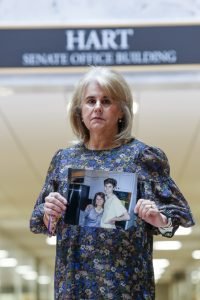This post was submitted by Maurine Molak in partnership with the David’s Legacy Foundation.
 My Family’s Story
My Family’s Story
In 2016, my family’s world was shattered by the death of our youngest son, David. At just 16 years old, David took his own life after months of being continually harassed, humiliated, and threatened by a group of students through text messages and social media.
In the last several months before his death, our previously joyful David became utterly overwhelmed by the constant online barrage of abuse directed toward him; as well as the damaging mental health effects of the design features and content he was exposed to prior to his death. As we so painfully learned, cyberbullying is a form of abuse that can lead to depression, low self-esteem, anxiety and, ultimately, suicide.
David’s Legacy was Born Out of Our Family’s Tragedy
To honor David’s legacy, we vowed to help prevent a similar tragedy from happening to another family. No child should face this kind of harassment, and no family should have to endure the pain of losing a precious child in response. My husband, Matt, and I, together with our other two sons, Cliff and Chris, created David’s Legacy, a foundation committed to eliminating cyberbullying through education, legislation, and legal action. Our Foundation’s mission is to eliminate cyberbullying and protect our children and teens from this senseless and cruel behavior.
David’s Legacy Spurred the Passage of David’s Law in Texas
Our Foundation’s hard work with Texas lawmakers resulted in “David’s Law” in 2017 and “David’s Law 2.0” in 2021, effectively giving schools the authority to intervene and investigate cyberbullying incidents that occur off campus. David’s Law requires Texas school districts to include cyberbullying in their district bullying policies and notify a child’s parents if he or she is either a victim of, or alleged aggressor in, bullying. It also allows schools to collaborate with law enforcement when serious or life-threatening cyberbullying situations arise. David’s Law 2.0 goes even further, requiring all schools in Texas to have an anti-bullying committee and provide lessons that improve campus culture and relationships.
Continuing the Fight Against Cyberbullying Beyond the State Level
Today, David’s Legacy has joined the national crusade to encourage responsible safeguards against online harms, and offer increased protection of children and minors online, through the passage of the federal Kids Online Safety Act (KOSA). I and dozens of other parents from across the country whose children died or were harmed due to incidents linked to social media have met with U.S. congressional leaders to share our stories.
What Online Privacy Rights Will KOSA Provide for Children, Teens, and Families?
KOSA will provide children, teens, and parents with the tools, safeguards, and transparency they need to protect against online threats to children’s health and well-being. The legislation requires that online platforms put the interests of our children first.
Key components of KOSA include:
-
Duty of Care
One of the most essential features of the bill is that it requires a duty of care for social media platforms to act in the best interests of minors. This would provide children and teens with a number of default protections, without families having to navigate a maze of complicated safety and privacy settings. It’s time these sites stopped putting profits before people, especially when those people are children and teens.
-
Restrict Harmful Content
KOSA will also limit the harmful content minors are exposed to. The bill directly addresses content related to suicide and self-harm, eating disorders, addictive substances, and sexualized content.
-
Promote Transparency
Tech companies use complicated algorithms to recommend content to kids and teens, and to predict their behavior online. These algorithms are designed to maximize young peoples’ time online, but also serve to provide increasingly dangerous content to children and teens. It is clear that self-regulation is not enough to hold tech companies accountable for the consequences of these content recommendation systems. Stricter auditing and public reporting requirements, as well as making this data accessible to researchers, are a vital step in ensuring that these companies are kept accountable for the platforms they build.
-
Establish Parental/User Controls
Families should have the right to mold and shape the kind of online experiences their young people can have. KOSA gives parents and guardians more control over the privacy of children and teens’ data, allowing them to “opt-out” or “down-rank” the kind of algorithmic recommendations that can send young people down a rabbit hole of dangerous content. It also enables families to track the amount of time their children spend on a particular platform.
-
Mitigate Harms
KOSA would ensure that the strongest, most protective online settings are switched on, by default, for minors. Parents are already dealing with enough stressors, and technology companies do not design their platforms with families’ understanding of how to put safeguards in place for children easily, in mind.
Who is Supporting KOSA?
Senators Richard Blumenthal (D-CT) and Marsha Blackburn (R-TN) are the two main sponsors of the KOSA, with 39 additional US Senators acting as co-sponsors. Its passage is also endorsed by numerous organizations, representing a diverse group of mental health experts, nurses, parents’ groups, consumer advocates, faith groups, tech experts, and communities like the American Psychological Association, American Academy of Pediatrics, Eating Disorders Coalition, and Mental Health America.
How Can I Help?
To increase the chances of the Kids Online Safety Act legislation passing, I encourage you to voice your support to Congress. The passage of this federal law will help make the Internet a safer experience for all of our families. You can contact your legislators and urge their advocacy for KOSA here.











